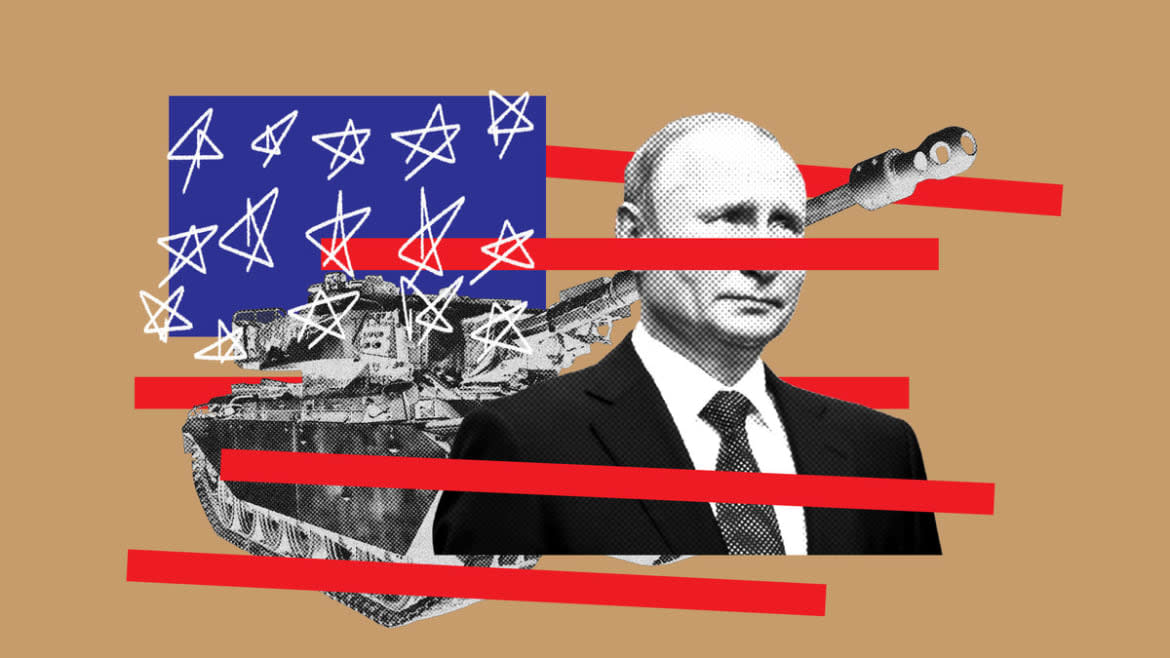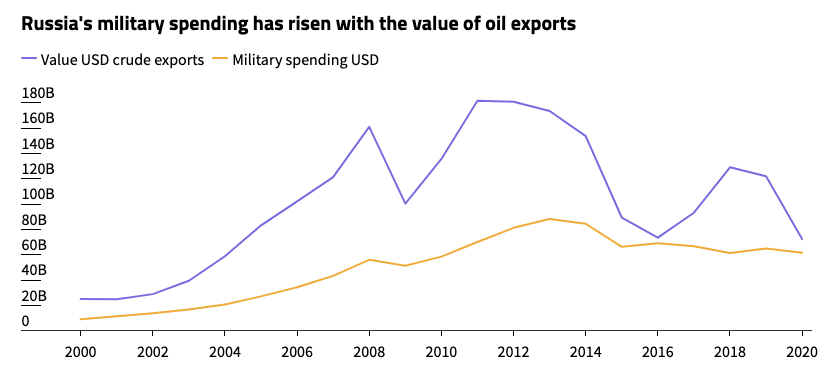Putin Is Right: The War in Ukraine Is Partly America’s Fault

- Oops!Something went wrong.Please try again later.
Vladimir Putin did not appear out of a vacuum to birth a gangster state, invade Ukraine, roil the planet in chaos, and order his hobgoblins on Russian television to incessantly threaten the world with mushroom clouds.
“Russia’s conquests and violence are the most natural and legitimate thing that has ever been done in history,” is one of the more recent soundbites from former Russian president Dmitry Medvedev.
The distressing question is whether there’s even a tinkle of truth to Putin’s bombast that the U.S. shoulders blame for Russia’s global aggression. Three decades of post-Cold War wheeling and dealing between Russia and the U.S. provide compelling evidence that Putin is right—but clearly not for the reasons spewed by him and his propagandists.
Nine years of news reports from Putin’s war in Ukraine—which exploded into a full land invasion almost 12 months ago—assorted armed mischiefs in Africa and assassinations of political opponents at home and abroad only continues to blur this historically larger and more damning canvas. It’s a portrait that illustrates the West’s three decades of collaboration to enrich Russian leaders, aid and abet their oligarchs, and use diplomatic guff such as “balance of power” to empower Putin.
Putin’s Men Fear ‘Minced Meat’ Fate in New Offensive
Even before Putin strong-armed his way into the Kremlin throne room in 2000 , the former KGB agent who was assistant to St. Petersburg Mayor Anatoly Sobchak, instigated a new financial dance with the West that would revolutionize Russia’s finances.
Putin’s Money Spinner
It was a modern twist on the Bolshevik “quartermaster” system, which he perfected once he was in the presidential suite. The procedure involved a Russian enterprise entering into lucrative and opaque joint-venture contracts with Western energy, manufacturing, distribution or trading companies. The split was always 51/49, with the Russian entity given ham-fisted jurisdiction of the lion’s share and always through one of Putin’s hundreds of genuflecting oligarchs, all hiding the details of the transactions beneath secretive layers of completely legal offshore companies.
Investment bankers—who during the 1998 Ruble Without a Cause economic crash said they’d rather eat cabbages from Chernobyl than lend to Russia—liked the new tune coming from Putin’s mouth and leveraged the sound of his music to peddle more Russian shares and bonds.
"The macro picture looks all very great, but you have a problem with almost every stock you look at," Morgan Stanley Dean Witter emerging market specialist John-Paul Smith cautioned at the dawn of the Putin era. "Everything is tainted on an individual basis."
Putin’s quartermasters were just as aware of the dodgy consequences of these deals as they were the shared profits that enriched them and created the global oligarch class. Somehow lost or ignored in the cash pile, however, was how Putin was spending Russia’s cut: Militarization.

“Very few people understood the reality of what Putin was doing,” says a former executive at General Electric, who had first-hand experience with the quartermaster system. “It’s one of those things that I’m unable to even talk about, let alone explain, with anyone who wasn’t there. There was too much naiveté, more than there should have been.”
Russia is not a nation. It is a global fascist enterprise. As a business, this is something remarkable, and those assigned the ongoing task of helping the country shed its brutal past and embrace the 21st century funded the process with eyes wide shut.
In 1991, for instance, U.S. Ambassador to Moscow Robert Strauss rationalized the wisdom of slathering post-Soviet Russia in multi billions of foreign-aid dollars and private-sector investments without a soupcon of due diligence. “I’d rather risk a couple of billion bucks out here for our country than fail to risk a couple of billion bucks and end up looking at a real fascist-type situation,” the former FBI agent from Texas explained over lunch in the dining room of the ambassador’s residence at Spaso House.
The first law of forensic science is Locard’s Exchange Principle: “Every contact between a perpetrator and a crime scene leaves a trace,” and there are perhaps not enough FBI evidence bags on hand to contain proof of the West’s enthusiasm to bankroll Putin’s crime spree and the paucity of its reverberation.
To be sure, five successive U.S. presidential administrations, the leaders of America’s NATO allies, the Davos Men at the World Economic Forum and Wall Street financiers ravening to feast on Russia’s natural resources had been repeatedly warned that Strauss’ “fascist-type situation” was baked into each and every deal cut with the post-Soviet Kremlin.
The reason, of course, was money. In 1989, Leonid Evenko, an aging high-level apparatchik at the Institute of the USA and Canada, explained how Russia worked its then nascent hustle.
“The best thing is to live here with the dollars we make from cooperative ventures with America,” Evenko said over tumblers of expensive whiskey and crusty cucumber sandwiches at the hard-currency bar of Moscow’s Savoy Hotel. “This is life. Leave Russia every now and then for a steak and shrimp cocktail in New York City. Americans will never understand this reality because you don’t really know or care what’s going on in the world. This is the big difference between us.”
Robert Trent Jones Jr. vividly remembers Russia before and after the West delivered prawns and T-bones to the Savoy. “I first arrived as a Yale student in 1961,” says the celebrated architect who built the first golf course in Russia, a negotiation that began in 1974 with Soviet Premier Leonid Brezhnev and multiple members of the Cold War Politburo. “I wanted to see my enemies up close.”
Instead, Jones kept finding Russian friends, all of whom, he says, “shared my ambitions and existential fears.” Their discussions, Jones recalls, “centered on how to peacefully make money with the threat of a thermonuclear cloud in the background.”
U.S. Money Blows Back
More than 50 years later, Russia and Wall Street are flush with cash, but only Putin continues to terrify the world with all-out nuclear malfeasance. “Everything will end with a nuclear strike,” Putin’s televised propagandist Vladimir Solovyov recently warned. “But we will go to heaven, while they will simply croak.”
Or perhaps die from indifference, according to a January 2023 poll conducted by the Pew Research Center, which shows the share of American adults who say the U.S. is providing too much aid to Ukraine has increased 6 percentage points since last September and 19 points since shortly after Russia launched its full-scale of invasion of the country in February 2021.
During one of his renowned poker games at Spaso House sometime between 1953 and 1957, U.S. Ambassador to Moscow Charles Bohlen poured another round of libations and expanded on the axiom that those who don’t study the past will repeat its errors, and those who do study it will find other ways to err.
“Let me tell you fellows something,” said Bohlen, who helped author the Marshall Plan to rebuild Europe after World War Two and played a marquee role in constructing America’s Cold War policy based on the Kremlin’s absolute obsession to reestablish the Russian imperium in order to guarantee external security of their internally weak regime.
“There are two lies that tell me to never trust anyone who tells them,” Bohlen continued, according to family members accustomed to his wit and wisdom. “The first is, ‘I never get drunk on Champagne.’ The second is, ‘I know how to get along with the Russians.’” Later asked to define Kremlinology, one of America’s foremost statesmen, who was honored with a postage stamp, said, “it’s the study of nine men wrestling under a rug, but you don’t know whose being hit and who isn’t.”
As Putin’s war in Ukraine drags into its second blood-soaked year, Bohlen’s 60-year-old evaluation of Russia is the only guaranteed bellwether of what happens next in Moscow, Kyiv and beyond.
There is no doubt that Western money and ignorance, peppered with no small dose of self-indulgence, empowered and continues to enable Russia’s invasion of Ukraine. It is a blood-crime scene and Putin is not the only person of interest.
Get the Daily Beast's biggest scoops and scandals delivered right to your inbox. Sign up now.
Stay informed and gain unlimited access to the Daily Beast's unmatched reporting. Subscribe now.

